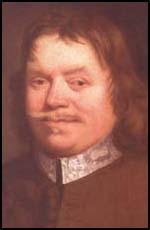John Bunyan

John Bunyan, the son of an illiterate tinker from Elsdow in Bedfordshire, was born in 1628. When he was sixteen Bunyan joined the Parliamentary army to fight for the Roundheads against the Cavaliers.
While in the army Bunyan came into contact with new ideas about religion and politics. As censorship was removed during the Civil War, Bunyan was able to read pamphlets that for years had been banned.
After leaving the army, Bunyan became a tinker. This job involved travelling around Bedfordshire repairing pots and pans. While in these villages, Bunyan, who was a Puritan, gave talks on his religious beliefs. In 1653 he joined a Congregational church in Bedford.
A strong opponent of George Fox and the Society of Friends Bunyan published two books attacking their beliefs, Some Gospel Truths Opened (1656) and A Vindication of Gospel Truths Opened (1657).
After the Restoration, Charles II and his Parliament attempted to stop Puritans preaching in public. In 1660 Bunyan was arrested at a meeting at Lower Samsell in Bedfordshire and found guilty of preaching without a licence to "unlawful assemblies".
Bunyan spent the next twelve years in Bedford gaol. While he was there he wrote a series of books about religion. This included Profitable Meditations (1661),I Will Pray with the Spirit (1663), Christian Behaviour (1663), The Holy City (1665), The Resurrection of the Dead (1665) and an autobiography, Grace Abounding (1666).
Bunyan was released in 1672, but five years later he was once again imprisoned for illegal preaching. While in prison for the second time, Bunyan wrote his most famous book, The Pilgrim's Progress. The book tells the story of a man called Christian who goes on a pilgrimage. On his journey Christian has a series of exciting adventures.
The Pilgrim's Progress is an allegory that is an attempt to explain the contents of the Bible. The book is very simply written and was one of the first books to be produced for a mass audience. The book was extremely popular and sold in very large numbers. The book has a universal appeal and over the years has been translated into over a hundred different languages.
Bunyan became a Congregational pastor at Bedford. He continued to publish books and this included an attack on Restoration society, Life and Death of Mr. Badman (1680), The Holy War (1682) and Pilgrim's Progress, Second Part (1684). John Bunyan died in 1688.
